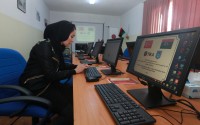News
23 March 2018136-Year-Old Turkish Heritage in South Africa: The Ottoman Cricket Club
The Ottoman Cricket Club, which was named after the school set up by Ottoman scholar Abu Bakr Effendi, still survives in Cape Town, South Africa after 136 years.
Founded by the students of Abu Bakr Effendi, who was sent to South Africa by the Ottoman Empire in 1863 to teach Muslims there and to resolve the conflicts between them, it is the first cricket club established by non-white people in the country.
Rydwaun Salie, Chairman of the Ottoman Cricket Club, emphasized in a statement to an AA correspondent that this club was the first sports club established by non-white people in South Africa and that the club was one of the most important establishments, which united marginalized people during times of racial segregation.
"The Ottoman Cricket Club has been one of the shared values that united oppressed South Africans throughout its history"
Salie underlined that the club’s contributions to the society were beyond a normal sports team throughout its history and said, "The Ottoman Cricket Club has been one of the shared values that united oppressed South Africans throughout its history. In this regard, the Ottoman Cricket Club has continuously fought against racism, which used to be implemented in this country as a state policy. We have preserved its name for the past 136 years despite all difficulties."
Salie remarked that they have upheld Abu Bakr Effendi's mission through this club and said, "Children learn about cricket, along with our cultural values, at this club. We have always held Islamic values above sports. This is the source of inspiration for our success and perseverance."
"We have expanded efforts oriented towards our youth team through the assistance provided by TİKA"
Salie stated that Turkey offered significant assistance to the club through the Turkish Cooperation and Coordination Agency (TİKA) and said, "In the past, our facility faced security problems and our training area was insufficient. Players had to wait in line to train. With TİKA's support, we have expanded efforts oriented towards our youth team, and the players are now able to prepare for the matches more effectively."
Salie expressed that the Ottoman Cricket Club is one of the largest youth teams in the country and said, "We would like to include other branches of sports at our facility as soon as possible. There are many young people who are interested in sports other than cricket. We aim to provide young individuals with the opportunity to play the sports that they are interested in at the Ottoman Cricket Club in order to better serve the community."
"It is a very important indicator of our civilization's perception of Africa"
Turkey's Ambassador to Pretoria Elif Çomoğlu Ülgen stated that the Ottoman Cricket Club is very valuable as it represents the century-old ties between Turkey and South Africa.
Ülgen said, "The fact that our ties with this very edge of Africa started with the aim of implementing educational, cultural, and sports activities, rather than colonialism, is a very important indicator of our civilization's perception of Africa."
Ülgen highlighted the fact that the club holds an important place in the country with its position in the league and the hundreds of young players it has raised; she added that there is no other country, where the Ottoman name is represented to this extent.
The Ottoman Cricket Club
In 1863, Ottoman scholar Abu Bakr Effendi was sent to South Africa by Sultan Abdulaziz to teach Muslims in the country and to solve sectarian conflicts between them. Abu Bakr Effendi, who established schools and taught in South Africa, served as a representative of the Ottoman state until his last breath.
Abu Bakr Effendi, who contributed to the spread of Islam in South Africa, passed away on August 29, 1880 in Cape Town after 20 years of service, and left behind several mosques and schools.
Abdullah Agmat, one of the students of the Ottoman Theology School established by Abu Bakr Effendi, founded the Ottoman Cricket Club in 1882 and named it after the school.

